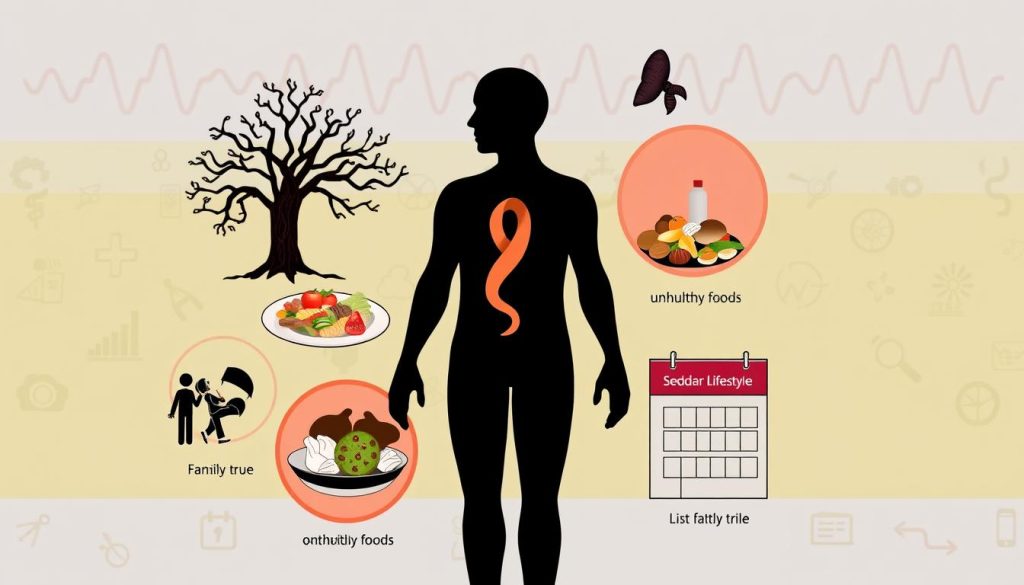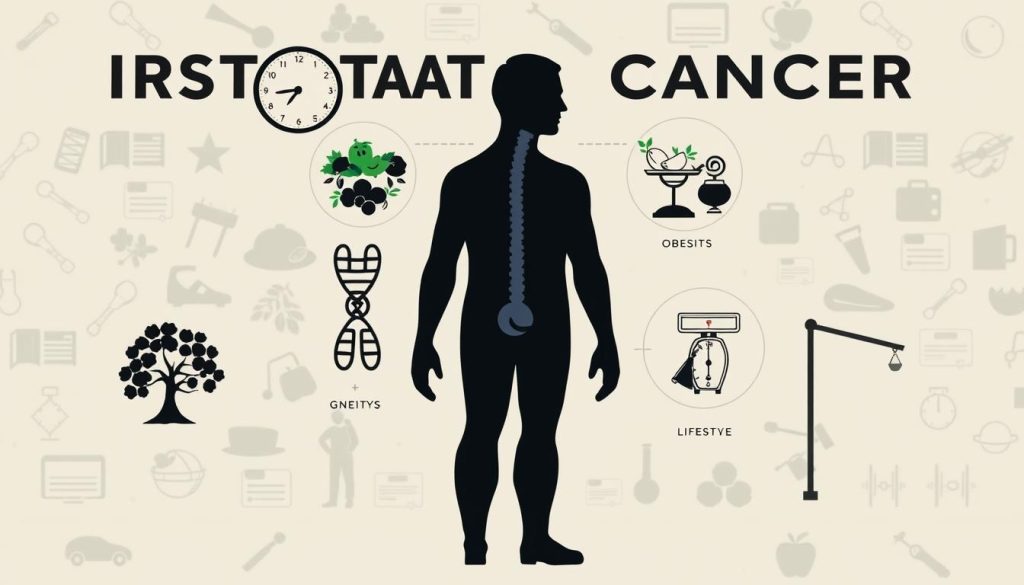Prostate cancer is a serious health issue that affects many men around the world. It’s important to know what causes it and how to prevent it. This guide will look at the different things that can lead to prostate cancer, like genes and lifestyle choices.
We’ll talk about the signs to watch for, how to get checked, and ways to prevent it. Our goal is to give you the information you need to take care of your prostate health.
If you’re worried about prostate cancer or want to learn more, this guide is for you. We’ll explore how to protect your prostate health together.
Understanding Prostate Cancer: Basic Facts and Statistics
Prostate cancer is a serious health issue for men around the world. It starts in the prostate, a small gland in the male body. Let’s look at the facts, figures, and how it affects people.
What is Prostate Cancer and Who Does it Affect
Prostate cancer happens when cells in the prostate gland grow too much. It mostly hits older men, with risk going up after 50. About 1 in 8 men will get prostate cancer in their lifetime. African American and Caribbean men of African ancestry are at higher risk.
Current Statistics and Prevalence Rates
In 2024, the U.S. will see about 299,010 new prostate cancer cases. It’s the most common cancer in men, but better detection and treatment have improved survival rates. Some men might not show symptoms in early stages.
| Year | New Cases | Deaths |
|---|---|---|
| 2024 | 299,010 | 35,250 |
Impact on Global Health
Prostate cancer is a big deal worldwide. It’s the second leading cause of cancer death in American men, after lung cancer. Knowing the prostate cancer stages is key for treatment. Early detection through screenings can improve life quality for those affected.
“Advances in prostate cancer research have given hope to millions. Each day, we’re getting closer to better treatments and possibly a cure.”
How Can You Get Prostate Cancer: Primary Risk Factors
It’s important for men to know about prostate cancer causes. While we don’t know all the reasons, some factors increase the risk. Let’s look at the main things that can lead to prostate cancer.

Age is a big factor in getting prostate cancer. As men get older, their risk goes up a lot. Family history also matters. Men with relatives who had prostate cancer are more likely to get it too.
Race and ethnicity also play a part. African American men are more likely to get prostate cancer. Scientists are trying to figure out why this is.
“Knowing your risk factors is the first step in prostate cancer prevention.”
What you eat and how active you are can also affect your risk. Eating a lot of red meat and dairy might increase your risk. But eating fruits and veggies and staying active can help lower it. Keeping a healthy weight is also good.
| Risk Factor | Impact Level |
|---|---|
| Age (65+) | High |
| Family History | Moderate to High |
| Race (African American) | Moderate |
| Diet (High in red meat/dairy) | Low to Moderate |
| Lack of Exercise | Low |
By knowing these risk factors, men can make better choices for their health. They can take steps to lower their chance of getting prostate cancer.
Age and Family History as Key Risk Factors
It’s important to know about prostate cancer risk factors to catch it early. Age and family history are big factors that can affect a man’s risk.
Age-Related Risk Assessment
Men’s risk of prostate cancer goes up as they get older. Doctors often suggest screening for men over 50. The risk jumps up after 65.
| Age Group | Risk Level | Recommended Screening |
|---|---|---|
| Under 40 | Very Low | Not typically recommended |
| 40-49 | Low | Discuss with doctor if high risk |
| 50-64 | Moderate | Regular screening advised |
| 65 and older | High | Annual screening recommended |
Genetic Predisposition and Family History
Men with family history of prostate cancer are at higher risk. If your dad or brother had it, your risk might double. Family history is a big part of screening decisions.
Hereditary Gene Mutations
Some genes passed down in families can raise prostate cancer risk. Genes like BRCA1 and BRCA2, linked to breast cancer, also play a role. Men with these genes might need more screening.
“Knowing your family history and genetic risk can empower you to take proactive steps in prostate cancer prevention and early detection.”
Understanding these risk factors helps men plan their screening with doctors. Early detection is key in fighting prostate cancer.
Lifestyle and Environmental Risk Factors
Looking into prostate cancer causes means checking out lifestyle and environmental factors. These play a big part in preventing and managing prostate cancer.
Diet and Nutrition Impact
Eating lots of fruits, veggies, and whole grains might help lower prostate cancer risk. But, eating too much red meat and high-fat dairy can up your risk. Tomatoes, rich in lycopene, might help protect you.

Physical Activity and Body Weight
Staying active and keeping a healthy weight are key to preventing prostate cancer. Being overweight can raise your risk of aggressive prostate cancer. Try to do at least 150 minutes of moderate exercise each week to lower your risk.
Environmental Exposures
Some environmental factors might raise your risk of prostate cancer. Exposure to pesticides and industrial pollutants could be harmful. Agent Orange exposure in veterans has been linked to prostate cancer too.
“While we can’t control all risk factors, lifestyle changes can significantly impact prostate cancer prevention.”
By eating well, exercising regularly, and avoiding harmful substances, men can lower their prostate cancer risk. Remember, getting regular screenings is key to managing prostate health.
Early Warning Signs and Symptoms
Spotting prostate cancer symptoms early is key to effective treatment. Some men might not notice anything, while others will see changes that need attention.
- Frequent urination, especially at night
- Difficulty starting or stopping urination
- Weak or interrupted urine flow
- Blood in urine or semen
- Unexplained pain in the lower back, hips, or pelvis
These signs can also mean other prostate issues. If you see any of these, see a healthcare provider for a proper check-up.
“Early detection is key. Don’t ignore potential warning signs – they could save your life.”
Less common symptoms might include:
- Erectile dysfunction
- Painful ejaculation
- Unexplained weight loss
- Bone pain that doesn’t go away
Remember, prostate cancer symptoms can be subtle. Regular check-ups and screenings are vital for early detection and successful treatment outcomes.
| Symptom | Frequency | Action |
|---|---|---|
| Urinary changes | Common | Consult doctor |
| Blood in urine/semen | Less common | Immediate medical attention |
| Pelvic pain | Varies | Discuss with healthcare provider |
Screening Methods and Early Detection
Prostate cancer screening is key for early detection and better outcomes. We’ll look at the main screening methods and guidelines for diagnosing prostate cancer.
PSA Testing Guidelines
PSA (Prostate-Specific Antigen) testing is a major tool in screening for prostate cancer. It measures PSA levels in the blood. Higher levels might mean cancer. The current guidelines suggest:
- Regular PSA testing for men aged 50-70
- Earlier testing for high-risk groups
- Talking over the pros and cons with your doctor
Digital Rectal Examination (DRE)
DRE is another vital screening method. A doctor checks the prostate gland for abnormalities during this exam. While not as precise as PSA testing, DRE can find issues that PSA might miss.
When to Start Screening
The right time for prostate cancer screening depends on individual risk factors. Generally:
| Risk Level | Recommended Screening Age |
|---|---|
| Average Risk | 50 years |
| High Risk (Family History) | 45 years |
| Very High Risk (Multiple Factors) | 40 years |
Early detection through proper screening can greatly improve treatment results. If you’re worried about prostate cancer, talk to your healthcare provider about the best screening plan for you. Remember, early detection is crucial for managing various cancers, including prostate cancer.
Prevention Strategies and Risk Reduction
Some risk factors for prostate cancer can’t be changed, but there are steps to lower risk. Prostate cancer prevention often starts with lifestyle changes. Eating fruits and vegetables, staying active, and keeping a healthy weight can help.
Reducing red meat and high-fat dairy intake might also help. Regular check-ups are key in catching prostate cancer early. Screening tests like PSA blood tests and digital rectal exams can spot signs before symptoms show up.
Early detection leads to better treatment options and outcomes. Men should talk to their doctors about when to start screening based on their personal risk factors.
For those diagnosed with prostate cancer, there’s hope. Prostate cancer survival rates have improved over the years thanks to better treatments. Options range from active surveillance for slow-growing cancers to surgery, radiation, or hormone therapy for more aggressive types.
Each case is unique, so working closely with a healthcare team is crucial for choosing the best approach. Remember, prostate cancer prevention isn’t just about avoiding the disease. It’s about overall health. By making smart lifestyle choices and staying on top of screenings, men can take control of their prostate health and well-being.
FAQ
Q: What are the main risk factors for prostate cancer?
A: Main risk factors for prostate cancer include age and family history. African American men and those with certain genetic mutations are also at higher risk. Lifestyle factors like diet and physical activity may also play a role.
Q: At what age should men start screening for prostate cancer?
A: Men should talk to their doctor about prostate cancer screening at:
– Age 50 for average risk
– Age 45 for high risk (African Americans and those with a first-degree relative diagnosed with prostate cancer before age 65)
– Age 40 for even higher risk (those with more than one first-degree relative who had prostate cancer at an early age)
Q: What are the early warning signs of prostate cancer?
A: Early prostate cancer often has no symptoms. But, some signs include:
– Difficulty urinating or a weak urine flow
– Frequent urination, especially at night
– Blood in urine or semen
– Erectile dysfunction
– Pain or discomfort in the pelvic area
Remember, these symptoms can also be caused by other conditions. Always consult your doctor for a proper diagnosis.
Q: Can prostate cancer be prevented?
A: While there’s no guaranteed way to prevent prostate cancer, you can lower your risk by:
– Eating a healthy diet rich in fruits, vegetables, and whole grains
– Exercising regularly and maintaining a healthy weight
– Limiting alcohol consumption
– Quitting smoking
– Discussing the potential benefits of certain medications with your doctor
Q: How is prostate cancer diagnosed?
A: Prostate cancer is diagnosed through a combination of:
– PSA (Prostate-Specific Antigen) blood test
– Digital Rectal Examination (DRE)
– Prostate biopsy, if initial tests suggest a potential problem
Advanced imaging techniques like MRI may also be used in some cases.
Q: What are the stages of prostate cancer?
A: Prostate cancer is staged from I to IV:
– Stage I: Cancer is confined to a small area of the prostate
– Stage II: Cancer is still confined to the prostate but may be larger or in both sides
– Stage III: Cancer has spread beyond the prostate to nearby tissues
– Stage IV: Cancer has spread to distant parts of the body, such as bones or lymph nodes
Q: What are the survival rates for prostate cancer?
A: Prostate cancer survival rates are generally high, especially when detected early. According to the American Cancer Society:
– The 5-year relative survival rate for all stages combined is 98%
– For localized or regional prostate cancer, the 5-year relative survival rate is nearly 100%
– For distant or metastatic prostate cancer, the 5-year relative survival rate is about 30%
Remember, these are general statistics, and individual outcomes can vary.


















